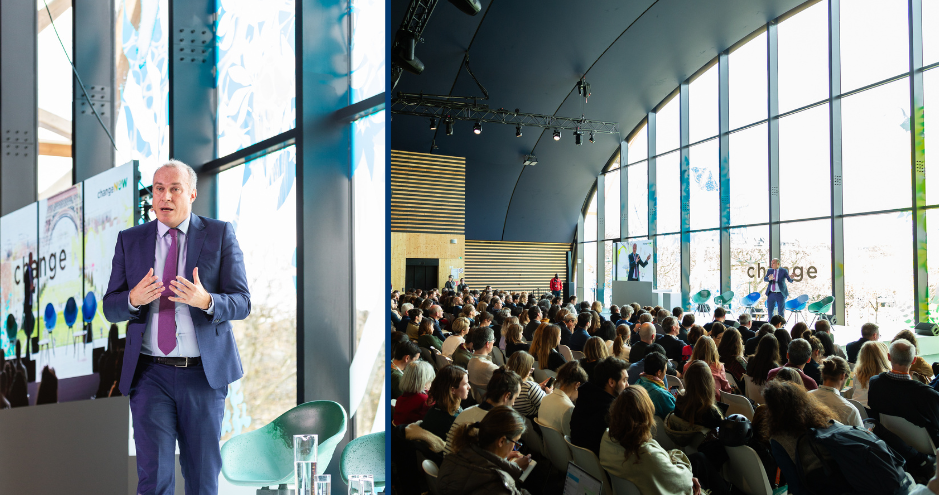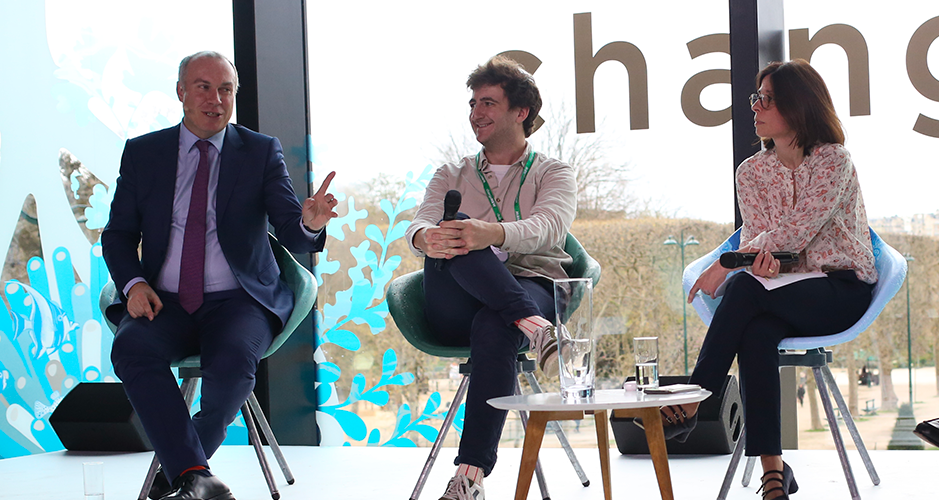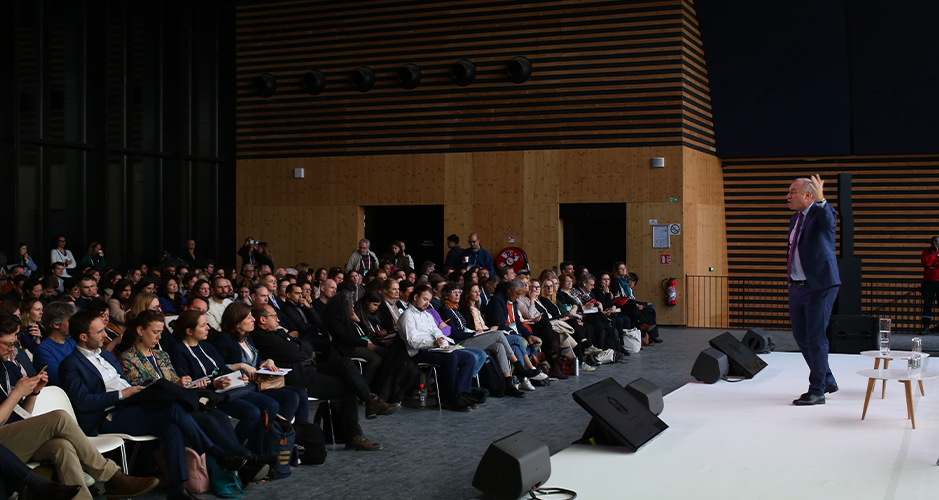Navigating Decarbonization Through a 2024 ChangeNOW Alliance
Navigating Decarbonization Through a 2024 ChangeNOW AllianceFor the third year running, HEC Paris partnered up with ChangeNOW, the largest solution-oriented event for the planet. In 2024, the annual academic partner discussed ways of furthering the Alliance for the Decarbonization of Road Transport, one of 1,000 innovation solutions explored during the three-day gathering. HEC professor and researcher François Gemenne led a six-person panel discussion to “tackle this elephant in the room”.

The statistics are frightening. In France, 90% of displacements are on roads, representing 32% of the nation’s greenhouse gas emissions. Much of these emissions are due to road freight trucking, the 600,000 trucks using French roads annually, mainly to transport agricultural products (representing 89% of all products). At a European level, this unimodal trucking also provokes heavy environmental impact. Its reliance on fossil fuels means it’s responsible for 27.2% of the continent’s greenhouse gas emissions (2019 figures released by the European Commission Statistical Pocket 2021).
Which made the March 27 ChangeNOW session led by François Gemenne all the more salient. The HEC academic director of the Master in Sustainability and Social Innovation (SASI) began the 90-minute exchange in front of a packed Eiffel Stage with a keynote speech mapping three misconceptions about climate change and their negative impact on collective action.
Gemenne then invited five specialists to engage on a newly founded Alliance for the Decarbonization Road Transport. Launched in December 2023, this initiative has brought together academics, scientists, infrastructure managers, automobile constructors, transporters, insurance agents, startups and representatives from local authorities and unions. An impressive coalition of 63 members that aims to drastically reduce the carbon footprint of transport systems. And to address what Gemenne calls the elephant in the room: “Road transport is the largest source of emissions in France,” he admits, “and is decreasing the least. But every time we try to address to issue, it divides, creating cleavages and hostility in the society. The goal of our Alliance is to seek out actual solutions on the ground, with local authorities backing us.”

Coalescing Disparate Partners
Invited to the panel to share their expertise were Stéphanie Clément-Grandcourt, Director General, for the Nature and Human Foundation; Nicolas Miravalls, member of International Road Federation (IRF); Pierre Coppey, Chairman at VINCI Autoroutes; Fabien Guimbretière, General Secretary at the center-right CFDT trade union; and Pierre-Amans Lapeyre (H20), co-founder & CEO of the young Bib batteries company. “These might be seen as strange bedfellows,” admits Gemenne after the 90-minute HEC session. “And you wouldn’t expect them to agree with each other. To me, it illustrates the fact that when you take the issue from the solutions angle, you can put disparate people around the table and combine to answer the huge challenge ahead of us.” Stephanie Clément-Grandcourt concurs: “In our Foundation we start with the idea it’s more efficient to go with, and not, against the tide. Our very raison d’être is to bypass divisive tactics and people. We think that working together on such an urgent issue is the way to move forward. We work with all political and economic actors – and we overcome any disagreements we might have together.”
The road freighting industry represents over 400,000 workers in France alone. For trade unionist Fabien Guimbretière, decarbonization of the roads cannot be implemented without involving fellow-workers/ “We need to anticipate this transformation,” he insists repeatedly. “New skills will be needed, we need to train our workers, guaranteeing their continued employment, making these new jobs attractive, safe and dynamic.” Pierre Coppey runs a company which is not always seen as in harmony with decarbonization. But the Chair of Vinci Autoroutes is defiant in addressing attempts to reduce his company’s carbon footprint: “The system has a tendency to create over-simplistic categories and create prejudices. One of these is the fact that rail freight is better than road transport. But, if you want to bring down carbonization you have to accept the fact that 90% of our transport is done by road, not rail! So, the former is the priority and that means having new types of energy, optimizing the vehicles being used, intensifying the practices of car-sharing and environmentally friendly buses, and so on.” During the exchange, Coppey evoked the advances in hydrogen-driven technology to answer the exponential number of vehicles circulating. An optimism reflecting the report released in 2019 by the International Energy Agency.

Breathing Life into Old Batteries
All panelists agreed on the need to have all sectors represented and working together. For three years, Pierre-Amans Lapeyre has been advocating the need to bridge all the stakeholders – manufacturers, users, repairers, second-life players and recycling organizations – involved in making the car battery value chain circular and profitable. The Bib company he co-founded in 2021 hopes to facilitate the scaling up of this economy to answer the numerous challenges of electrifying mobility (as illustrated by French reporter and regular HEC speaker Guillaume Pitron in his numerous presentations and publications). “We hope to ensure that the 100 million vehicle batteries that will reach the end of their lives in Europe by 2030 have as little impact as possible on the environment,” Lapeyre notes. Bib uses an algorithm to gauge the residual value of batteries before choosing to repair, recycle or give them a second life. The company’s genesis occurred in Lapeyre’s final year at HEC when he met co-founder Martin Vaz, an engineer graduating from Ecole Polytechnique. Since the firm’s launch three years ago, it has saved its clients 300 tons of CO² and €1.2 million.
The global nature of the debate was an important one for Gemenne and the panelists. “Obviously, the roads don’t stop at the French border, but we live here so we begin with the actors that are immediately available,” the academic confides after the panel ends. “But the global dimension is important for our actions, which is why we invited a representative from the International Road Federation.” The presence of Nicolas Miravalls, member of the IRF and CEO of the first-ever digital construction materials platform ORIS, underlined the point. Miravalls has extensive international experience in the infrastructure industry and worked 15 years in Africa and Eastern Europe/ “IRF provides a neutral and global platform for the road and mobility sectors,” he says. “Its network continues to grow every year enabling it to better connect the sectors and to promote safer, greener, more sustainable road transport, and mobility.” The Geneva-based NGO draws on its 75-year history to better connect the actors across the five continents. On March 12, it joined the Alliance to help it shape the action and debate around the green transition. “This is an incredibly rich eco-system, pulled together in such a short period of time. We hope to see the first results of this collaborative work presented during our World Congress in Istanbul in October this year.”
The HEC ChangeNOW session, baptized “Adaptation as a Solution”, was followed by dozens of the school’s students amongst an audience of 300 in the auditorium overlooking the Eiffel Tower. “It’s so important to have this student presence,” confides Stephanie Clément-Grandcourt. “Many of them will be the leaders of tomorrow and it’s very, very important that they understand the stakes today. HEC’s presence within the Alliance through the engagement of François Gemenne (who presides the Scientific Council of our foundation), is vital, too. François is an advocate on our side and a teacher on theirs and it’s the best possible combination to prepare the students’ future. They will have to guide our world on this path towards decarbonization and the massive challenges we all face.”